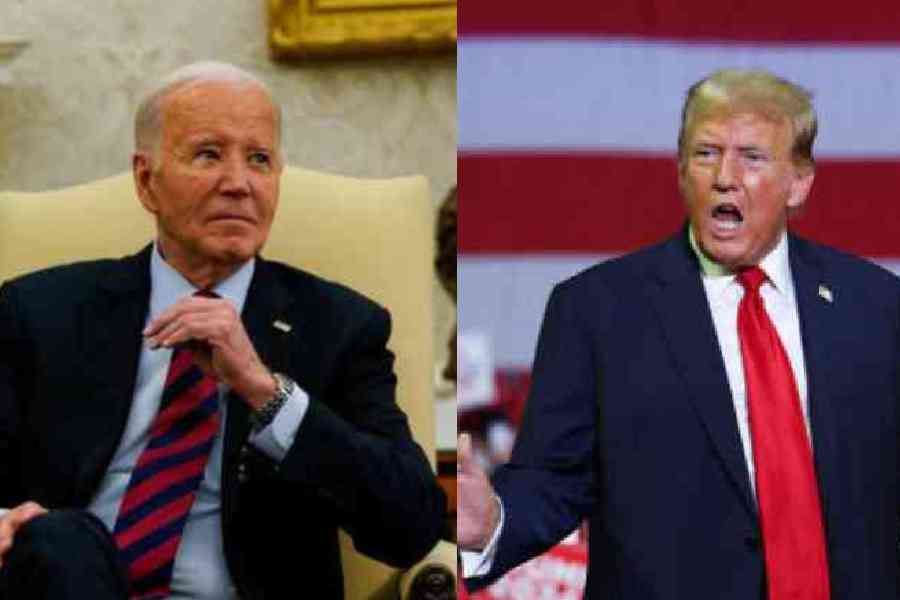The debate between President Biden and former President Donald J. Trump this week will be the highest-stakes moment of their rematch, plunging two Presidents into an extraordinarily early confrontation before a divided and angry nation.
For Biden, the debate in Atlanta offers an opportunity to remind voters of the chaos of his predecessor’s leadership, his criminal convictions and to warn of an even darker future should he win a second term. For Trump, it’s a chance to make his case that America has grown more expensive, weaker and more dangerous under his successor.
But the face-off on Thursday also poses significant risks for the two men — both of them the oldest candidates ever to compete in a presidential race — who have been locked in a contentious rivalry defined by mutual hatred for more than four years. That animosity heightens the evening’s unpredictability. A notable misstep — a physical stumble, a mental lapse or a barrage of too-personal insults — could reverberate for months, because of the unusually long period until they meet again for the second debate in September.
“This is a big inflection point,” said Karl Rove, a leading Republican strategist who guided George W. Bush’s two successful presidential runs. “Can Biden be consistently cogent, causing people to say, ‘Well, maybe the old guy is up to it?’ And is Trump going to be sufficiently restrained that people say, ‘You know what, it really is about us, not about him?’”
This presidential debate will be the earliest in the nation’s history and notably different from those familiar to many Americans. Hosted by CNN rather than a nonpartisan commission, it will be simulcast on more than five networks, without a live audience and without opening statements. Each candidate will have two minutes to answer questions, followed by one-minute rebuttals and responses to the rebuttals, and their microphones will be muted when it is not their turn to speak.
The two men are taking strikingly different approaches to their preparation. Biden hunkered down with his aides at Camp David for formal debate sessions, with the part of Trump expected to be played by Bob Bauer, the President’s personal attorney. The former President is taking a looser approach but is participating in more “policy sessions” than he held in 2020.
Trump’s advisers hope the former President keeps his attention on the issues that are widely seen as Biden’s biggest vulnerabilities — inflation and immigration — and is not baited into exchanges over his false claims about a stolen 2020 elections and a justice system he claims is rigged against him.
Biden’s team sees an opportunity to focus Democratic and Independent voters, and even some moderate Republicans, on how much more radical a second Trump administration might be than the first. Yet they are also preparing for Trump to deliver a more disciplined performance than in the first debate of 2020, when he had a chaotic showing that was likened to a “dumpster fire”.
“This debate is an opportunity to show the American people what those of us who watch Donald Trump all day, professionally, are seeing, which is that he is more unhinged, he is more dangerous, he is out for revenge, and anything that raises those stakes directly with the American people is a net positive for us,” said Rob Flaherty, a deputy campaign manager for Biden.
For his part, Trump is preparing to answer questions about threats to American democracy and his promise to pardon rioters involved in the January 6 attack on the Capitol. He has told associates he will emphasise that he will tackle the January 6 pardons on a “case by case” basis and will distinguish between those who committed violence and those who didn’t.
And after spending months questioning Biden’s ability to endure a 90-minute debate at all, let alone perform at a peak level, Trump has reversed himself to attempt to reset higher expectations.
“I don’t want to underestimate him,” Trump said on a recent podcast. He referred back a dozen years to Biden’s 2012 vice-presidential debate to praise the President’s skills. “He beat Paul Ryan, so I’m not underestimating him,” Trump said.
Steven Cheung, Trump’s communications director, blamed the media for setting low expectations for the President.
“The true benchmark for Thursday’s debate should be whether or not Joe Biden can defend his disastrous record on inflation and the out-of-control border invasion versus President Trump’s unquestioned first-term record of success,” Cheung said.
The event will be the first time American voters see Biden and Trump in a direct exchange since October 2020, when they met for the final debate of their last race. It is also the first time they have been in the same room since then.
Much has changed in the interim. The country has lived through a pandemic, an uncertain economy, a siege on the nation’s Capitol, the fall of federal abortion rights and become enmeshed in two bloody global conflicts. Trump is now a felon, convicted of 34 counts by a New York jury. And Biden has become an unpopular President, facing deep opposition not only from Republicans but among his party’s base.
And yet polls have shown little movement between Trump and Biden. Both men are widely disliked by broad swaths of the nation and locked in a tight race, though Trump had been largely narrowly ahead in national polls earlier this year.
Gail Gitcho, a Republican strategist, argued that rhetorical clashes onstage could matter less than usual given voters’ experiences living under both the Biden and Trump administrations.
“What voters are considering is how was my life under President Trump and how is my life under President Biden,” she said. “They are either choosing between presidencies or personalities — and they’re more likely to choose between presidencies.”
New York Times News Service










